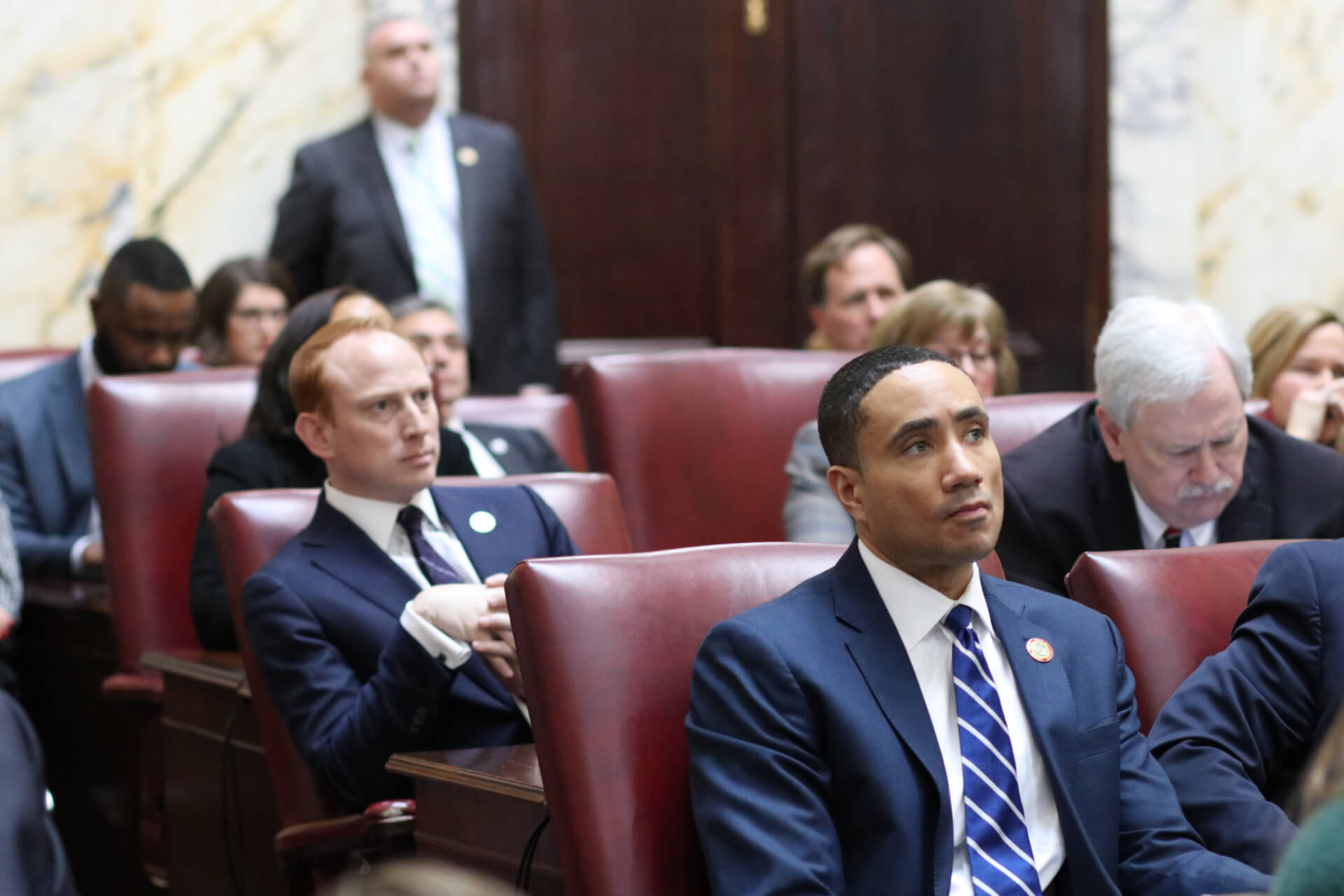Despite GOP Objections, Senate Panel Hears First Round of Policing Bills

Despite dissent from Republican members, the Senate Judicial Proceedings Committee heard its first round of police accountability bills at a virtual hearing Tuesday afternoon, kicking off a three-day round of off-season legislating.
In all, the panel will consider 15 separate bills.
“Today is the day that we begin the healing process between law enforcement and the communities they serve, including communities of color,” Committee Vice Chairman Jeffrey D. Waldstreicher (D-Montgomery) said in his opening remarks.
Sen. William C. Smith Jr. (D-Montgomery), the panel chairman, described this week’s bill hearings as a good-faith effort to workshop the legislation ahead of the 2021 General Assembly session, saying it’s the “most transparent and the most inclusive process we could have had under these circumstances.”
Sen. Jill P. Carter (D-Baltimore City) said that, between 2013 and 2020, she sponsored over 30 pieces of legislation aimed at reforming state policing policies.
Between 2013 and 2019, 138 people were killed by police officers in Maryland. Only two of Carter’s reform bills have passed.
“It’s because of our fondness, affection, reverence and respect for law enforcement, that for far too long, we have ignored citizen complaints; we have ignored the millions of dollars that we spend every year on settling … civil actions against police brutality, excessive force and wrongful death, and now is the time that we must take it seriously,” Carter said.
Republican committee members struggled to get on board with the unusual hearing, reiterating grievances brought forth in a letter sent to Senate President Bill Ferguson (D-Baltimore City) Monday.
Sen. Michael Hough (R-Frederick) complained Republicans on the committee were not involved in the crafting of the 15 bills — which he described as having “a very partisan tone.”
In the letter to Ferguson, minority party lawmakers requested that the committee cancel this week’s hearings; they also wanted the bills reintroduced as part of a package of anti-crime measures to be considered during the session.
The four Republican lawmakers on the Judicial Proceedings Committee, who co-signed the Monday letter, alleged that they were not invited to submit bills of their own and that members of the public may not even know about the hearings.
Sen. Christopher R. West (R-Baltimore County) called Tuesday’s testimony “really thin,” asserting that members of the public don’t know about these hearings because they aren’t happening during the session.
Ferguson defended holding the hearings this week in a letter of his own, calling them a “starting point” to receive “meaningful input” from stakeholders on both sides of the debate.
Republicans argued during the hearing that crime in Baltimore needs to be addressed ahead of statewide policing policy.
Sen. Robert G. Cassilly (R-Harford) echoed the cry in the Republican Caucus’ letter for the committee to refocus its attention on the city.
“Police are not the problem here because really they, like the citizens, are just victims of the failure of governance,” said Cassilly.
The Baltimore Sun’s homicide database reported that, as of Tuesday, 241 homicides have occurred in Baltimore City since the beginning of the year ― 107 fewer than 2019’s homicide count with just over three months left in the year.
“Crime does not get resolved if the general public does not feel that they have … a trustworthy relationship with Baltimore Police,” said Sen. Charles Sydnor III (D-Baltimore County).
Sydnor, one of the three bill sponsors, said the effort to ensure accountability should not be seen as an affront to police officers.
“Public safety is not just about locking people up,” Sydnor said. “I suggest that we not forget that police are not the complete system — just a part.”
Bills, Bills, Bills
Maryland is one of nine states without a standard state use of force policy. Carter introduced a bill Tuesday that would create a uniform policy across all 24 jurisdictions.
“My position is that we need to have force as a last resort, only when necessary, and it should never be excessive,” Carter said.
Republicans looked at the legislation warily.
“The question we should always ask about legislation in any area as it relates to police reform and these kind of policies is: Are we setting up an impossible standard for use of force where any use of force is presumed guilty, or is presumed to be too much and the officer has to desperately prove their case?” Sen. Justin Ready (R-Carroll) asked.

Sen. Jill P. Carter
Carter said that advocates believe, and she agrees, that this draft of the bill is just a start and that it needs to be fine-tuned. She also introduced legislation Tuesday to eliminate no-knock warrants, mandate officers intervene in use of force instances and institute whistleblower protections for officers who report misconduct.
Smith brought forth a bill to limit the ability of law enforcement agencies to procure certain military-grade equipment, including firearm silencers, grenade launchers and armored aircraft or drones.
From 1997 to 2019, the state spent $11 million to purchase military equipment, Smith said.
Cassilly questioned the proposed prohibition on grenade launchers, noting that they can also shoot gas and flares. “Is there going to be some discretion here?” he asked.
Smith said while he believes “these things should be off the table,” he’s willing to discuss nuances in the legislation.
Baltimore County Fraternal Order of Police President Dave Rose said it should be up to departments to justify the equipment they need to serve their jurisdictions.
Sydnor proposed legislation to implement a police misconduct database available for public view under the Maryland Public Information Act.
Rashawn Ray, a fellow at the Brookings Institution in Washington, D.C., said that had Sydnor’s legislation had been enacted sooner, a number of individuals killed by police, including Anton Black, would be alive today.
Black was killed in police custody in Greensboro in 2018. The officer involved had multiple use of force records on his personnel file while serving as an officer in Delaware before transferring to Maryland.
Carter and Del. Gabriel Acevero (D-Montgomery) sponsored police reform legislation in Black’s name last session — and intend to do so again.
Several people who have been directly impacted by police violence, including Black’s sister La Toya Holley, testified before the committee in favor of the proposed legislation.
Holley said her brother was “arrested, tried, convicted and executed in less than 30 minutes … within three feet of the window to his bedroom, and less than two feet from our mother” — and that the police officers responsible were not held accountable.
Rose had misgivings about the creation of a public misconduct database, noting that officers may face public scrutiny for unfounded allegations and false complaints.
Carter said that when she was overseeing Baltimore City’s civilian review board, less than 5% of officers facing criminal allegations were ever convicted. Noting his hesitancy, she asked Rose what he recommends doing to increase misconduct findings if he opposes the creation of a public database.
She called law enforcement agencies’ practice of policing themselves through internal affairs investigations “a colossal failure.”
Rose took issue with Carter’s categorization.
“The facts are the facts. The investigation leads where the investigation leads,” he said. “An impartial investigator does not set out to prove a theory the investigator may have.”
Carter asked Baltimore Police Chief Michael Harrison what percentage of complaints against officers result in a finding of misconduct. He said 32% of complaints were sustained in 2019, and about 18% have been sustained so far in 2020.
Sydnor also brought forth legislation Tuesday that would require officers to report instances of misconduct against their colleagues.
Seven of 15 bills were heard before the committee Tuesday, all sponsored by Carter, Sydnor and Smith. Bill hearings continue Wednesday and Thursday from 1 to 5 p.m.
Meanwhile in Montgomery…
At the same time the Senate hearing was taking place Tuesday, the Montgomery County Council held a public hearing on a bill that would reform policing in the state’s largest jurisdiction.
Sponsored by Councilmembers Hans Riemer (D) and Craig Rice (D), the bill would: give the county police chief final say over disciplinary measures when an officer is accused of brutality or other wrongdoing; enable citizens to serve on a police department internal disciplinary hearing board; and reform the collective bargaining process to allow county leaders more say over department procedures.
 “The goal of this legislation is to strengthen our police department,” Riemer said in a statement. “These reforms will help create a more accountable and transparent department; and make the County and MCPD more capable of implementing critical reforms in the future. The vision is for our Department to one day lead the country in community trust and accountability.”
“The goal of this legislation is to strengthen our police department,” Riemer said in a statement. “These reforms will help create a more accountable and transparent department; and make the County and MCPD more capable of implementing critical reforms in the future. The vision is for our Department to one day lead the country in community trust and accountability.”
But at Tuesday’s hearing, the proposal was met with a lukewarm response, at best.
Some progressive activists said the legislation did not go far enough.
“It’s outrageous and a waste of our time,” said one activist, Stephanie Guttormson, who called the measure “placating window dressing.”
Paulette Kee-Dudley, vice president of the United Food and Commercial Workers Local 1994, which represents Montgomery County employees, said the union worried that the legislation would erode collective bargaining rights.
“We are not advocating that you should protect bad police officers,” she said. “…Taking away collective bargaining rights should not be the way we start reform.”
Montgomery County Police Chief Marcus Jones, speaking for County Executive Marc B. Elrich (D), said it was too early to act on the local legislation — especially considering that the measures under consideration by the state Senate could impact policing at the local level.
The Montgomery County Council Public Safety Committee is scheduled to consider the Riemer-Rice bill on Oct. 1.
Josh Kurtz contributed to this report.




 Creative Commons Attribution
Creative Commons Attribution